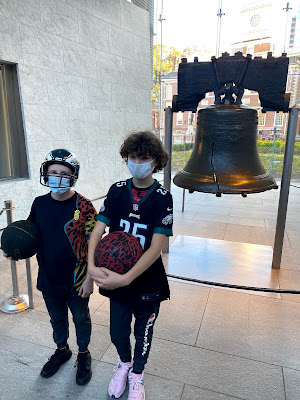Wow, that was quite the October in terms of political chaos, unexpected twists and turns (Philly shooting, protests, and looting, Pres gets covid, Pres does 18 events in 4 days), but we seem to be on the back side of it, regardless of the tactics of some of the politicians and their media mouthpieces on the right assert.
Took my son and a friend to Philly to see what democracy looks like.
I'm in a position where each and every day I interact with persons across the political spectrum, and what is interesting is I read a stat a week or two ago that claimed that 70%+ of people do not interact or even know someone who is not in their political silo. I don't believe everything I read, and polls are under great scrutiny, but even if it was half that, I would still see it as an astonishing data piece and explains a lot.
I go out of my way to get information from a wide range of sources - magazines, newspapers, news, radio, random apps like tik tok and instagram. Too much information lately, where by the time election rolled around my phone reported a daily use of screen time of 8+ hrs!!!! I don't really know how they measure that - is listening to a podcast screen time? Or a newscast, or call in radio show? I hope so, though I admit I have a newbie energy level for tik tok - guiltfree too, since I think it's really fun, and lack of guilt makes it all the more dangerous. Keep an eye out for my tik tok shuffle I'm working on.
As a builder, in the niche I occupy, I interact with a wide range of persons, as I said above. I sell homes in upstate (rural and red) to the coastal elite (families from NYC and mostly blue), I work everyday with a range of subcontractors and employees (red) and I also work with surveyors, engineers, lawyers, accountants who are educated, many times male and a tad older and harder to pigeon hole into a political generalization (purple).
It's a fascinating vantage point - with a ton of information and preferences and actions coming from all sides. What is true today, if you turn off the news, most people I'm interacting with have moved on, accepted the results, and are now in the process of putting politics back where it always was - white noise in the background, instead of a daily test of how loud can you support your candidate.
Late last week, as the counts were drip drip dripping in, and cable news was doing a great job of narrating the drama when nothing much was happening, I attempted to go news free for a day. When that didn't happen, I tried for a couple of hours. When that didn't happen, I tried for an hour. Waking up in the middle of the night, refreshing my phone, praying for a non-trump headline. Back in 2016, I went to sleep only to wake up, check the results, and was as shocked as the next guy, and not in a good way. Anyways, I finally on Monday started to create some distance between me and the news, and now I'm trying to check in at the end of the day for the Arizona counts, and other stuff. Nothing much changes hour to hour, so for me at least, checking in less is better, and actually just as informative. Not easy though. Everyone has their TV on to the news.
You have to wonder how long Arizona is going to be at 98% counted? They've been stuck there for a week, and you have really get a kick out of Fox News' premature call of that state, since now it is down to 14,000 votes. What a stake through the heart of Trump's election night momentum.
It's like the Trump Show is truly afraid of what comes next for it. How can you make an argument with a straight face of stopping the count in Georgia and PA, continuing to count in Arizona, claiming that the tight races they are losing are fraudulent but not a word about the close races they won, no introspection into last election, just as tight, with voting done with the same rules, but turned in their favor?
You can make the argument because you know your support is wide, and 2 subsets of that support are the following - people with something political at stake, and non-college educated voters, many of whom are drowning in their chosen sources of information, echoing and repeating a small and selected slice of the day's news.
And let's admit it - education matters. Education gives you empathy, perspective, hope, a baseline of comparing today with other days/times.
Also, from what I saw, Trump turned out the vote. I don't have the data, but I wouldn't be highly surprised if first time voters and 'low propensity' voter counts were large and unprecendented. Trump motivated people to vote who don't regularly participate in the political process. I think the trouble there, however, is these people won't continue to vote, won't be regular voters, and will go back to not participating. Their enthusiasm for Trump is not easily transferable to just any state or national candidate. In fact, just the opposite.







No comments:
Post a Comment